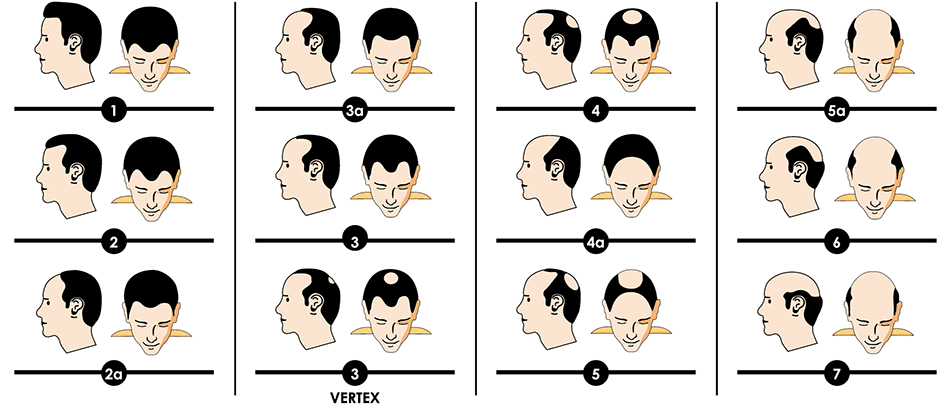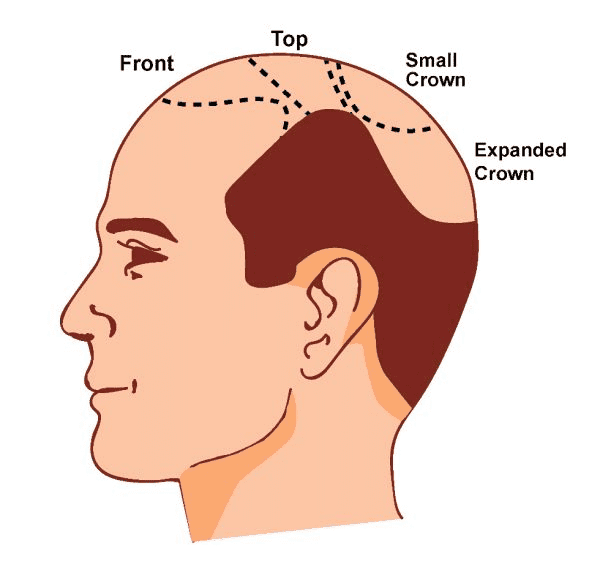Are You Experiencing Hair Loss?
Eternal Hair & Esthetics provides free consultations, both online and in-person at our world-class north New Jersey clinic, for anyone experiencing hair loss who would like to consider hair restoration techniques. All the information provided will be confidential. Although our online consultation can give us an idea of the patient case, please remember that an in-person exam will allow our certified hair experts a better evaluation of your hair loss.
The most common cause of hair loss is a medical condition called hereditary hair loss, often known as pattern baldness. About 80 million men and women in the United States have this type of hair loss. While the physical symptoms of hair loss may be tough to deal with, the impact of hair loss on your confidence can be even tougher.
Fortunately, most causes of hair loss can be addressed or treated when diagnosed appropriately and Eternal Hair & Esthetics’ patients enjoy an over 98+% success rate with our hair transplant techniques.
Learn more about:

How My Grade of Hair Loss Is Determined?
The grade of Hair Loss in men and women are determinate by scientific scales called (Norwood Scale) for men and (Ludwig Scale) for women. These scales have an illustration with the degree of the hair loss or alopecia scalp disorder that the patient is suffering, and is often used to determine the severity of the hair loss.
Norwood Scale

Ludwig Scale

Hair loss can be a distressing experience, but it’s essential to know that it is a common condition that affects both men and women. A proper diagnosis can help determine the best course of treatment and prevent further hair loss. If you’re experiencing hair loss, the first step towards treating it is understanding the cause.
Here are some additional tips and information on diagnosing hair loss:
- Family history: Hair loss can be hereditary, so it’s essential to know if your family members have experienced hair loss. This information can help determine if your hair loss is due to genetics. Here are some additional tips and information on diagnosing hair loss:
- Medical history: Hair loss can be a symptom of an underlying medical condition, so it’s important to share your medical history with your doctor. Conditions such as thyroid disorders, lupus, and diabetes can cause hair loss.
- Medications: Certain medications can also cause hair loss, so inform your doctor about any prescription or over-the-counter medications.
- Physical examination: A physical examination of your scalp can help identify any underlying skin conditions or infections that may be causing hair loss. Your doctor may also examine the pattern and severity of your hair loss to help determine the cause.
- Blood tests: Blood tests can help identify any underlying medical conditions causing hair loss. Your doctor may order a complete blood count (CBC), thyroid function test, or other tests to determine if your hair loss is related to a medical condition.
- Biopsy: In some cases, your doctor may recommend a scalp biopsy to help diagnose the cause of hair loss. During a scalp biopsy, a small sample of your scalp tissue is removed and examined under a microscope to help determine the cause of hair loss.
Remember, early diagnosis is vital in treating hair loss effectively. You can regain your hair and confidence with the right diagnosis and treatment plan. If you’re experiencing hair loss, don’t hesitate to talk to experts such as the doctors and medical experts in hair restoration at Eternal Hair & Esthetics.

Implantation Distribution Zones
One crucial factor to consider when diagnosing hair loss is the distribution of hair loss on the scalp. The pattern of hair loss can give clues as to the underlying cause of the hair loss and help guide treatment options.
One way to classify the distribution of hair loss is by using implantation distribution zones. These zones are areas of the scalp where hair follicles are naturally grouped and can help identify the specific pattern of hair loss.
There are three main implantation distribution zones on the scalp:
- Anterior Implantation Zone: This zone is located at the front of the scalp and includes the hairline and temples. Hair loss in this zone is commonly seen in male-pattern baldness and female-pattern hair loss.
- Mid-Scalp Implantation Zone: This zone is in the middle of the scalp, between the anterior and posterior zones. Hair loss in this zone can indicate androgenetic alopecia or telogen effluvium.
- Posterior Implantation Zone: This zone is located at the back of the scalp and includes the crown. Hair loss in this zone is often a sign of male pattern baldness.
Other factors to consider when diagnosing hair loss include the shape and size of the balding area, the rate of hair loss, and any accompanying symptoms such as itching or scaling of the scalp.
If you are experiencing hair loss, it is crucial to seek the advice of experts such as those at Eternal Hair & Esthetics to determine the underlying cause and appropriate treatment options. Treatment options may include medication, hair transplant surgery, or lifestyle changes such as improving diet and reducing stress.

